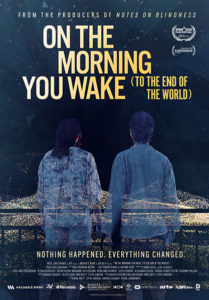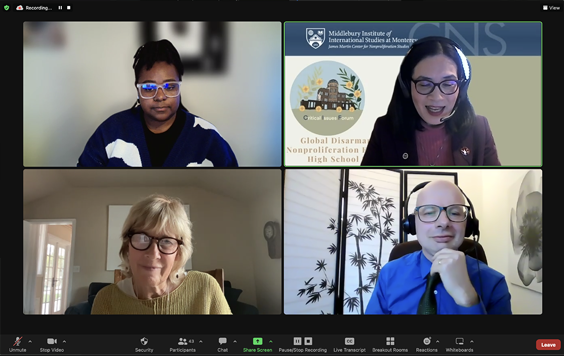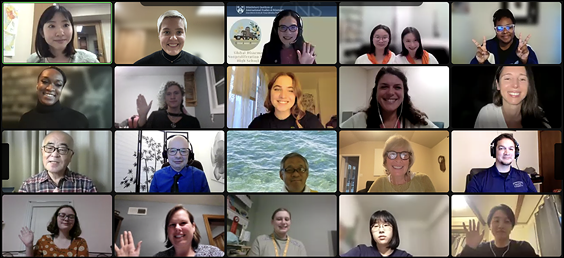November 3, 2022
Masako Toki
On October 14th, 2022, the James Martin Center for Nonproliferation Studies (CNS) hosted the Critical Issues Forum’s (CIF) seventh Speaker Series: “The Power of VR and Storytelling: Building Empathy for a Nuclear Weapons Free World.” The event featured an award-winning documentary film On the Morning You Wake (To the End of the World) about the 2018 ballistic missile false alert in Hawaii and two guest speakers.
On January 13th, 2018, 1.4 million people across Hawaii received an SMS from the State’s Emergency Management Agency: BALLISTIC MISSILE THREAT INBOUND TO HAWAII. SEEK IMMEDIATE SHELTER. THIS IS NOT A DRILL. Then, 38 minutes later, they found out that it was a false alert. The film uses innovative documentary storytelling and virtual production techniques to viscerally recreate the lived experiences of people who went through the situation where they feared that the world might end that day.

After introductory remarks on the CIF’s mission by CNS Project Manager Masako Toki, CNS Deputy Director Jessica Varnum welcomed the participants. Jessica encouraged participants, especially youth, to be part of the solution to global challenges such as nuclear threats, which is an overarching theme of the CIF Speaker Series. Jessica also highlighted the immense potential that innovative technology and new tools can have in helping to solve global challenges.
Michaela Ternasky-Holland, an award-winning Extended Reality (XR)/metaverse storyteller, is currently at Games for Change as a Creative Strategist & Impact Producer to promote this film and enhance its social impact. She sent an inspiring message to the event participants, expressing her desire to create a “constellation of organizations, activists, and people working wholeheartedly in policy to disarm nuclear weapons around the world.”
Keynote Speakers
The first keynote speaker, Cynthia Lazaroff, is the founder of Women Transforming Our Nuclear Legacy and NuclearWakeUpCall.Earth. As a resident of Hawaii, she shared her personal account of the 2018 Hawaii false alert that was a “deeply personal near-death experience.”
As a nuclear expert, Cynthia has tremendous knowledge on the impact of nuclear weapons. However, this real experience significantly changed her perspective and made her more determined to contribute to nuclear abolition.
She stated, “Even with everything that I knew about nuclear weapons and nuclear war, nuclear war was unimaginable to me until I went through these 38 minutes. This experience is still with me as a mother and a human being. It’s never going to go away until we eliminate nuclear weapons.”
Cynthia emphasized the significant impact that this film can have, and she expressed her excitement that “On the Morning You Wake was like an answer to a prayer.” She shared that the purpose of this film is not just about an awakening, but an awakening to action. She called for action as “we all have agency and we all can make a difference and have a role to play” in preventing nuclear catastrophe. She also highlighted the value of concerted efforts for nuclear abolition, because “None of us can do this work alone.” Cynthia encouraged the audience to promote the idea that “This work belongs to all of us because, if nuclear weapons can destroy all of us, we all have a role to play in eliminating them.”
The second speaker, Erinn Budd, is a multi-hyphenate creative and experiential producer currently serving as an impact producer at the Games for Changes for “On the Morning You Wake.”
Erinn first described the structure of this film by briefly summarizing each of the three chapters. As an impact producer, Erinn highlighted that her job is to bring people to a place where they can empathize with the feelings of the people who experienced the nuclear scare in Hawaii that morning, even if they aren’t familiar with nuclear disarmament topics. She illustrated that the core message of the film is about home, which everybody can relate to. Erinn and the rest of the team wanted people to focus on this familiar feeling and “not on the doom and gloom of mushroom clouds.”
Erinn emphasized that by using virtual reality (VR), the film creates an atmosphere that feels close to the viewer and can “almost shake you.” She also shared her experiences traveling around the world, showing the film to as many people as possible and encouraging them be an agent of change as they learn from the VR experience.
Panel Discussion

After the keynote speeches, CNS scientist-in-residence Dr. Ferenc Dalnoki-Veress joined the conversation as a moderator. The discussions among these three experts with different backgrounds were insightful and inspiring.
Ferenc highlighted that hope is a large part of the movie and was powerfully expressed in the poem by Dr. Jamaica Osorio. He asked the panelists how hope can be used as a superpower in a way that can effect change. Cynthia responded that there is always something you can do right now to make a world better and safer, stressing “no act is insignificant.” She emphasized how important it is to speak to elected representatives and to engage local governments in the conversation about the threats of nuclear weapons. Erinn reiterated that no audience is too small to engage, either in conversations or in showings of the film.
Ferenc asked the speakers how we can get people to visualize a world without nuclear weapons. Cynthia used the example of policymakers who doubted that the Treaty on the Prohibition of Nuclear Weapons (TPNW) would enter into force. She talked about the repurposing of spending billions and trillions on weapons and war and using these resources for peace and causes that future generations can benefit from.
Erinn was asked if her company will be making more VR and augmented reality (AR) projects that address global and social issues. She explained that they have an initiative called extended reality (XR) for Change which focuses on mixed reality (MR) to use for social change.
Both Cynthia and Erinn agreed that the film uses powerful storytelling and compelling messages of hope and home to reach audiences around the world. After the panel discussion, participants discussed their impressions of the film and their thoughts on nuclear disarmament in small groups during the breakout session.
Conclusion

The risk of nuclear weapons is as great as it has been since the end of the Cold War, making this Speaker Series topic extremely timely. At the same time, participants were able to learn how to make a positive impact for nuclear disarmament no matter how small it might be.
This is particularly important for young people who will shoulder the future of our world. In that sense, the Critical Issues Forum is very honored to be able to continue to engage high school students from around the world to promote disarmament and nonproliferation education.
This year’s Critical Issues Forum project is made possible by funding from the Tom and Sarah Pattison Fund, the SAGA Foundation, the Kathryn Wasserman Davis Collaborative in Conflict Transformation Fund, Mr. Gregg Wolpert, and many generous private donors.
